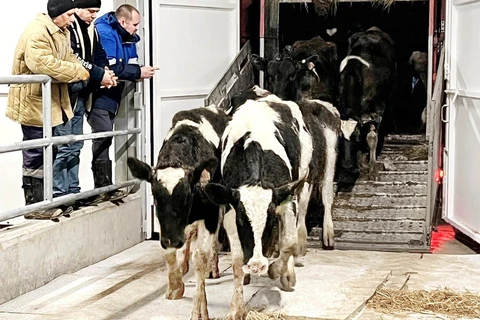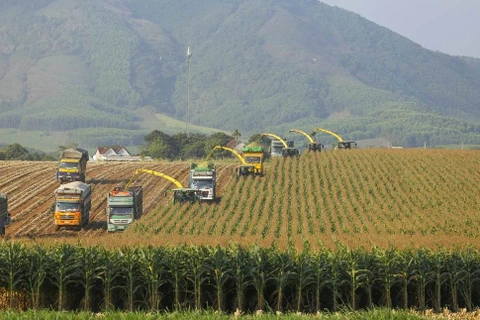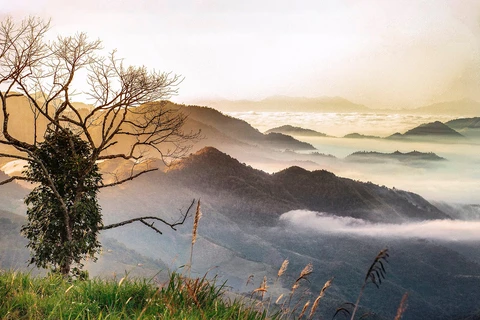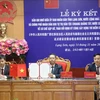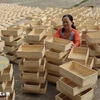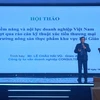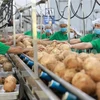Hanoi (VNA) - The Huoi Du mountain range around Muong Long and Huoi Tu communes (Ky Son district, the north central province of Nghe An) is covered by forest. Under the thick green canopy, plants proliferate, with many types of medicinal herbs with high values, such as lingzhi mushroom.
In recent years, through their collaboration with TH Group, local residents in Ky Son know how to pick herbs the right way, preventing the depletion of the precious resource that they call the “gifts from heaven”. All the herbs collected by locals are bought by TH Group, ensuring stable livelihood for them.
Arduous journey to pick up herbs in forest
It was 6am and the Pha Xac hamlet in Huoi Tu, which is more than 2,000m above sea level, was still shrouded in fog, but Vu Chong Lau and his wife were already ready to go into the forest to pick lingzhi mushrooms. They simply brought along some water bottles, some food, a machete and a backpack basket. Besides, they wore clothes that covered all the body along with a pair of over-knee boots to protect themselves from leech.
The trail in the forest is only wide enough for one person to walk. During the rainy season, the path becomes slippery so a forest goer must cautiously make each step.
Lau walked nimbly on the trail, and he seemed to have no difficulty in finding the sites where lingzhi mushroom could be found even in the dense forest.
After nearly one hour, we reached a site on the mountain. Leeches were everywhere, ready to attack any exposed part of the body.
Lau approached a rotten big tree, and we could see many lingzhi mushrooms growing on it with caps from 8-15cm. Lau used a knife to cut off those mushrooms that were about half a span high, taking care not to hurt smaller ones. The mushrooms had a pleasant fresh smell.
Lau told us that the time from June to September is the rainy season, and lingzhi and other medicinal herbs grow quickly in the wet forest. At this time of the year, locals also complete the work on their fields, so they go to the forest to pick up herbs to earn some incomes.
“Some days I return empty handed after a whole day in the forest, but when fortune comes, I can pick several kilogrammes of lingzhi. I found this site some weeks ago, but the mushrooms were very young then, so I marked the site and calculated the time to return today,” Lau said.
In the rainy season, locals first pick lingzhi in nearby forests, and then travel farther to other mountains. Lau and other villagers usually walk 20-30km a day to look for the mushroom.
Ly Y Mo, who has a lot of experience in picking lingzhi, said locals look for the mushroom based on experience. She said about over one month after the rainy season begins, the mushroom will appear and grow up. If they are not picked when mature, the caps will then rot. Therefore, lingzhi mushrooms must be picked at the right time for them to keep the best quality.
According to Mo, after TH Herbals company (a subsidiary of TH Group) arrived in Ky Son to conduct nature conservation activities and purchase medicinal herbs, locals eagerly go to the forest to pick lingzhi, hoping to increase their incomes. It is noteworthy that the company’s staff have guided locals in how to pick the mushroom the right way, avoiding depleting the resource.
“In rainy season, on a decayed tree there might be nearly 20 lingzhi mushrooms with various sizes, but we only pick the big ones, leaving the small ones to grow,” Mo said.
Local Lingzhi mushroom hunters said they always leave part of the mushroom stems to keep the resource, as the mushrooms will continue to grow when it rains.
The mushroom hunting journey on Huoi Du range extended nearly 20km. The villagers were happy because they had a good harvest for the day.
Engaging in conservation to ensure livelihood
At 5pm, Lau Y Si (in Huoi Tu commune) loaded 10 bags containing lingzhi mushrooms onto her old Wave motorbike and rode the bike to the Muong Long centre for medicinal plant conservation and development, which is run by TH Herbals. The director of the centre, Lau Chia Long was waiting for her. “ You and the villagers have picked a lot this time,” he exclaimed while helping Si unload the bags.
Holding a big lingzhi mushroom weighing nearly one kg in her hand, Si smiled, satisfied with the results of almost one week trekking in the forest by her and her neighbours. The bags weighed a total 86kg.
Si said her family earns around 5-6 million VND (about 200 USD) each mushroom picking season, which is an extra income in between-harvest time.
Asked how to know which mushrooms meet quality requirements and which do not, Si said before each season, technical staff of the Muong Long centre for medicinal plant conservation and development always hold meetings with locals to guide them in selecting and picking herbs for the best possible quality.
“In such training classes, we learnt that if we pick all the mushrooms, from big to small, in the future there will be no more mushrooms in nature to pick. So we understand that we need to protect the medicinal herbs in nature for following years,” Si said.
Besides lingzhi mushrooms, locals also collect other medicinal herbs such as Giao co lam (Gynostemma pentaphyllum) or Lac tien (Passiflora foetida) and sell them to the centre.
“We buy a large quantity of the herbs. Locals collect them in early morning and bring them to the centre to sell in the afternoon. Take Giao co lam as an example, a villager can harvest between 30-50kg a day, and the same for Lac tien. Each year, our company buy around 4 – 5 tonnes of Lingzhi mushroom and 8 -10 tonnes of Giao co lam, all collected from the forest,” Nguyen Duc Khang, a technician at the Muong Long centre for medicinal plant conservation and development said.
 During the peak season in June and July, staff members at the centre work around the clock and even hire workers to purchase and preliminarily treat the herbs.
During the peak season in June and July, staff members at the centre work around the clock and even hire workers to purchase and preliminarily treat the herbs. During the peak season in June and July, staff members at the centre work around the clock and even hire workers to purchase and preliminarily treat the herbs.
Technicians at the centre will check the quality of purchased herbs, sort, wash, slice and dry them before packaging them for storage, waiting for processing. The herbs will then be processed using modern technology to produce the final products.
Si said before the centre was set up, locals had to travel nearly 30km to Muong Xen town to sell the herbs. Sometimes traders intentionally paid very low prices. Now the centre is only 3km from her village, and the prices offered by the centre are often higher than those on the market.
In Ky Son, a land along the western border line in Nghe An province, villagers everyday go to the forest to look for “heaven’s gifts” not only to sell for a living but also know that those herbs will be turned into herbal tea products by TH Group./.
Related stories:
[TH true Herbal: key to unlock Muong Long herbal treasure]
[Thai Huong: Spreading love of forests to make Vietnam bloom]
[TH Group brings best, cleanest herbal tea to consumers]
[Medicinal herbs – cash cow for central border region]





